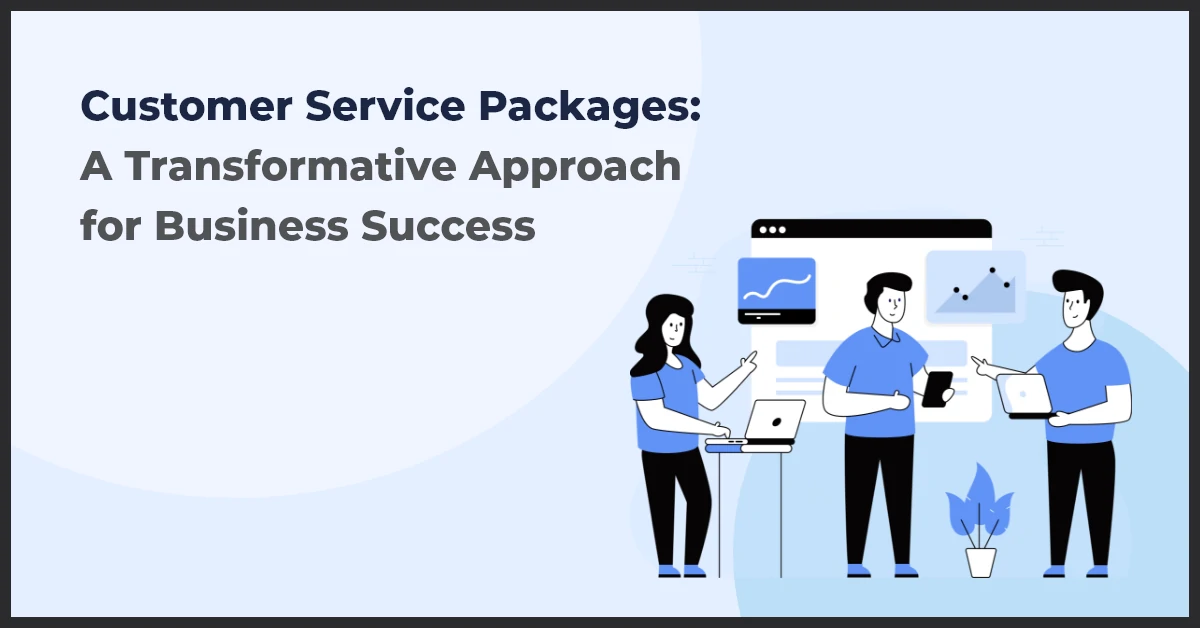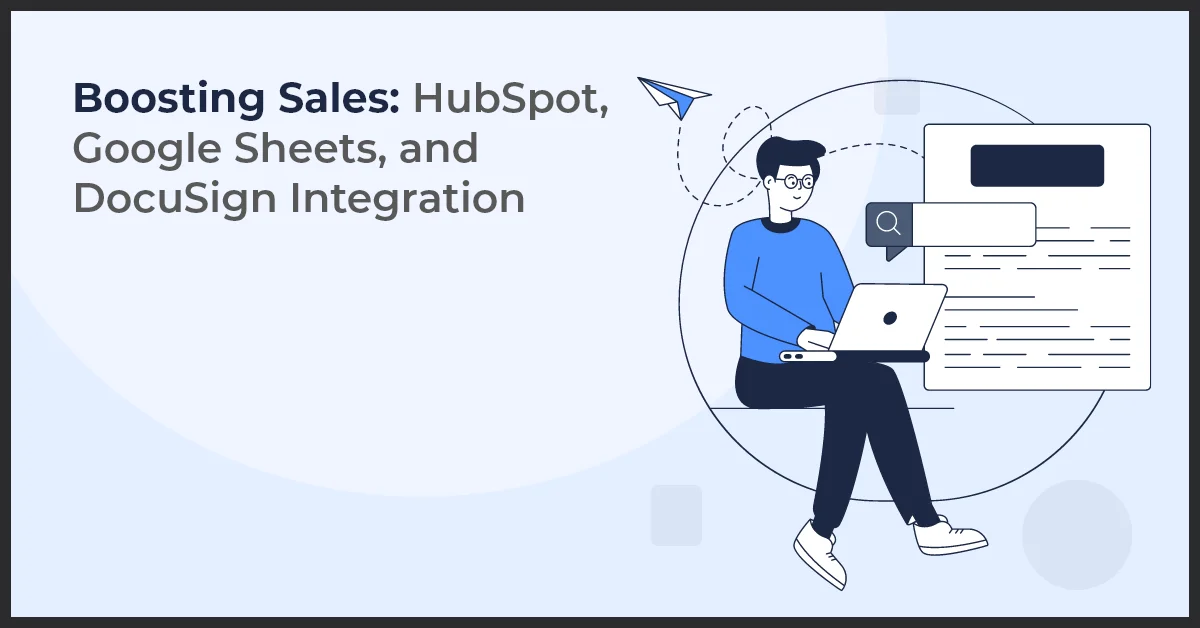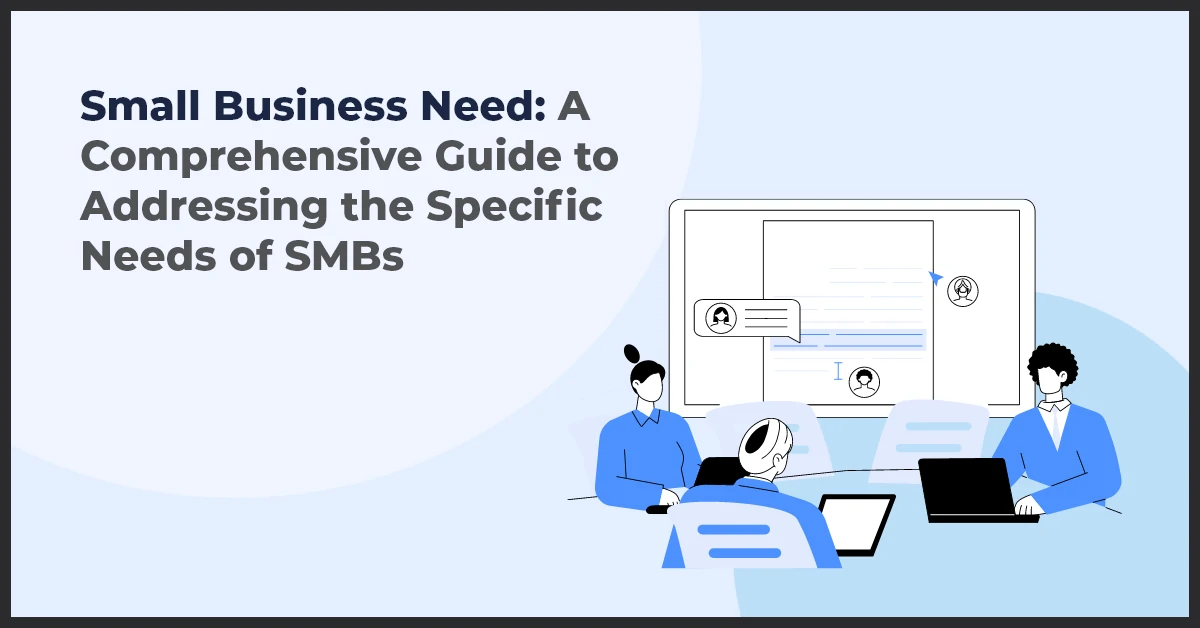Customer Service Packages: A Transformative Approach for Business Success

Published on: May 24, 2023
Updated on: July 09, 2024
1162 Views
- Business
10 min read
Whether you're a budding startup, an established SME, or a multinational corporation, an impressive customer service package is a non-negotiable ingredient in your recipe for success. But what exactly are customer service packages, and why do they hold such a pivotal place in the business landscape?
Let's dive in and unveil the concept.
Customer service packages aren't just about solving problems or answering queries—they're about creating an exceptional, personalized experience that differentiates your brand, fosters loyalty, and ultimately drives growth.
It's about going beyond the conventional definitions of service and viewing every customer interaction as an opportunity to elevate your brand's reputation, creating memorable experiences that resonate long after the customer leaves.
In this blog, we'll take a magnifying glass to the core of customer service packages, unveiling their true essence, elements, and their immense potential in shaping the future of businesses.
What Is a Customer Service Package?
A customer service package is a set of services, features, and support provided by a company to address the needs and inquiries of its customers. It encompasses various elements to ensure customer satisfaction, resolve issues, and maintain positive customer relationships.
A customer service package aims to ensure a positive customer experience, build trust and loyalty, and address customer needs promptly and effectively. It reflects the company's commitment to providing exceptional service and support throughout the customer journey.
A customer service package typically includes the following:
- Communication Channels: Companies offer multiple channels for customers to reach out and seek assistance, such as phone support, email support, live chat, or self-service options. These channels allow customers to connect with customer service representatives based on their preferred mode of communication.
- Prompt Response Times: A key aspect of a customer service package is the commitment to timely responses to customer inquiries or concerns. It ensures that customers receive assistance and resolution as quickly as possible, reducing frustration and enhancing satisfaction.
- Knowledgeable Support: Companies ensure customer service representatives possess product knowledge and expertise to assist customers effectively. It includes a deep understanding of the company's products, services, policies, and procedures to provide accurate and helpful information.
- Issue Resolution: A customer service package focuses on resolving customer issues efficiently and effectively. It involves:
- Actively listening to customer concerns.
- Identifying the problem.
- Working towards a satisfactory resolution.
Companies may have escalation processes to address more severe or complex issues.
- Personalized Assistance: Some customer service packages offer customized assistance to customers. It includes account management services, tailored recommendations, or dedicated support teams for specific customer segments or VIP customers. Personalization adds a personalized touch to the customer service experience.
- Continuous Improvement: Companies committed to providing a comprehensive customer service package seek customer feedback to improve their offerings. They gather insights and implement changes based on customer feedback to enhance the quality and effectiveness of their customer service.
Why Do Customers Demand Good Service?
Customers demand good service because it is crucial to their overall satisfaction and experience. When customer expectations regarding product quality, service quality, and value-based price are met or exceeded, it cultivates a positive perception of the brand, fosters customer satisfaction, and builds long-lasting customer relationships.
Customers expect timely and efficient assistance, knowledgeable support, and personalized attention. They seek good service to feel valued, respected, and understood as individuals.
Also, customers demand for good service because it enhances convenience, resolves issues promptly, and provides a smooth and enjoyable customer journey. Ultimately, all this directly impacts their perception of a company, influences their purchasing decisions, and encourages loyalty and positive word-of-mouth recommendations.
Components of Customer Service Package
Delving into the components of our customer service package, we can liken it to an onion, with multiple layers building up to the heart of it all - the service experience.
- Essential Infrastructure: This layer forms the backbone of our service offering. It refers to the physical or digital platforms that must be functional before you can offer a service. For instance, it could be a robust data center for a cloud services provider, a warehouse for a logistics company, or a state-of-the-art manufacturing plant for an OEM parts supplier.
- Enabling Commodities: This next layer includes the materials and goods the client business uses or provides to facilitate the service. For a cloud services provider, this might consist of the servers or computing hardware the customer offers. For a manufacturing company, it could mean raw materials or machinery parts supplied by their clients.
- Informative Inputs: This layer includes discussing the essential data shared between you, the service provider, and your customer. In a B2B setting, this could involve sharing inventory data for a logistics provider, usage statistics for a software-as-a-service (SaaS) company, or production timelines for a manufacturing firm.
- Explicit Services: Explicit services are the visible benefits experienced by the client business. It could be the seamless functioning of a business's IT infrastructure managed by an IT service provider, the on-time delivery of goods by a logistics partner, or the implementation of an efficient new software system by a SaaS provider.
- Implicit Services: Finally, implicit services pertain to the intangible value or psychological benefits derived from the service. It might involve the trust and security a business feels when outsourcing IT services to a reputed provider, the prestige associated with partnering with a renowned logistics company, or the peace of mind with a reliable manufacturing supplier.
Your customer's perception of your service is shaped by the cumulative experience across these five integral features. Each touchpoint, from the initial interaction with the necessary infrastructure to the subtle psychological benefits of the implicit services, is vital in forming their overall impression.
For a service manager, crafting a holistic and cohesive experience that aligns seamlessly with the envisioned service package is crucial. Every element, tangible (like enabling commodities and explicit services) or intangible (like informative inputs and implicit services), must work harmoniously to create a consistent, high-quality service experience.
In the B2B landscape, for example, a SaaS provider must ensure their cloud infrastructure is robust and reliable (essential infrastructure), the software is up-to-date and user-friendly (enabling commodities), real-time usage data is available (informative inputs), the software enhances the client's operational efficiency (explicit services), and the client feels secure and valued throughout the partnership (implicit services).
In the end, a well-executed service package meets the client's needs and surpasses their expectations, laying the foundation for trust, loyalty, and long-term business relationships.
7 Benefits of Having Customer Service Package
A well-structured customer service package provides numerous benefits for businesses and their customers. A robust customer service package is a significant asset for any business, driving customer satisfaction, brand reputation, operational efficiency, and overall business growth. Let's look at these in more detail:
- Enhanced Customer Satisfaction: A well-rounded service package ensures a comprehensive and consistent service experience, improving customer satisfaction. It caters to diverse customer needs, covering all essential and extra touchpoints, thus increasing the chances of meeting and exceeding customer expectations.
- Brand Differentiation: A unique, well-structured service package can serve as a differentiating factor in a crowded market. By providing a service experience that goes above and beyond the standard, businesses can set themselves apart from competitors, enhancing their brand reputation.
- Increased Customer Retention: High-quality service packages contribute significantly to customer loyalty. Businesses can cultivate long-term relationships with their clients by consistently delivering excellent service and meeting customer needs, resulting in higher retention rates.
- Business Growth: Satisfied customers are more likely to refer your business to others, leading to increased word-of-mouth marketing and potentially attracting new clients. This organic growth can be a powerful driver for expanding your customer base and scaling your business.
- Streamlined Operations: A well-defined service package can help streamline operations by setting clear customer and service staff expectations. It outlines what customers can expect to receive and what the business needs to deliver, reducing confusion and increasing operational efficiency.
- Reduced Costs: By standardizing service delivery through pre-defined packages, businesses can reduce costs associated with customizing services for each client. It allows for better resource allocation, improved efficiency, and cost savings.
- Improved Business Insights: By tracking the performance of their service packages, businesses can gather valuable insights into customer preferences, service efficiency, and areas for improvement. These insights can guide future strategies, product development, and service enhancements.
What Are the Best Customer Care Phrases?
In the delivery of a customer service package, it's often beneficial to incorporate standard, well-regarded phrases that are commonly used within the customer service industry. Here are 11 standout expressions to consider for effective customer communication:
- "Thank you for choosing us." Express gratitude for the customer's decision to do business with your company.
- "How may I assist you today?" Show willingness to help and initiate the conversation with a customer-centric approach.
- "I apologize for any inconvenience caused." Acknowledge and take responsibility for any issues or challenges the customer has encountered.
- "I understand your frustration and am here to help resolve it." Be empathetic and reassure the customer that you are committed to finding a solution.
- "Let me investigate that for you." Demonstrate proactive problem-solving by offering to look into the customer's concern.
- "Is there anything else I can help you with?" Show attentiveness and willingness to address additional questions or concerns the customer may have.
- "I'll do my best to find a quick resolution for you." Assurance is the key. Show that you are committed to looking for a satisfactory resolution.
- "Thanks for bringing this to our notice. We value your feedback." Acknowledge and appreciate customer feedback, emphasizing its importance to your company.
- "Please reach out with further concerns or questions." Encourage open communication and let the customer know you are available for ongoing support.
- "We genuinely appreciate your patience." Express gratitude for the customer's understanding and patience, especially during complex or challenging situations.
- Remember, using these phrases genuinely and with a friendly tone can contribute to a positive customer experience and strengthen customer relationships.
Conclusion
In conclusion, providing an exceptional customer service package is a cornerstone of building successful customer relationships. When customer expectations regarding product quality are met or exceeded, it not only delivers on the promise of a reliable and satisfactory product but also goes beyond to create a lasting impact.
It establishes trust in the brand, assuring customers that their investment is worthwhile. Meeting or surpassing these expectations enhances customer satisfaction and gives them a sense of value. Consequently, this positive experience strengthens customer loyalty, encouraging repeat business and advocacy.
By consistently striving to meet and exceed customer expectations regarding service quality, businesses can forge strong bonds with their customers, leading to sustained success in the market.
If you want to level up your customer experience and drive growth, we encourage you to take the next step. Contact Growth Natives at info@growthnatives.com or call +1 855-693-4769 to discover how we can help you build a customer-centric strategy, exceed expectations, and cultivate long-lasting customer relationships.
Let's unlock your business's full potential and create a remarkable customer journey together.
Frequently Asked Questions
Customer service packages enhance customer satisfaction by providing clarity and consistency in service offerings, improving customer retention, and differentiating the business from competitors.
By offering tiered packages that cater to different customer needs, businesses can provide more personalized experiences, proactive support, and incentives that encourage customers to stay loyal.
They can significantly improve satisfaction by offering predictable service levels, faster issue resolution, access to exclusive features, and personalized attention that aligns with customer expectations.
Customer service packages create positive experiences that strengthen emotional connections with the brand, foster trust, and encourage repeat business and advocacy among satisfied customers.
Traditional customer service often involves reactive responses to issues. In contrast, customer service packages proactively anticipate customer needs and provide comprehensive, predefined solutions.



